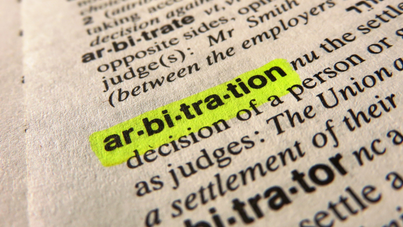Author
The Arbitration Act 1996 (“the Act”) is 25 years old. It provides an important framework for dispute resolution in an agricultural context. The Law Commission has launched a consultation document to review certain parts of the Act to ensure it remains at the cutting edge.
The specific areas that are addressed are confidentiality, independence of arbitrators and disclosure, discrimination, immunity of arbitrators and interim measures ordered by the court. The consultation also looks at three more topics which are examined at length in this article, namely:-
- Summary disposal of issues which lack merit
- Jurisdictional challenges against awards under section 67; and
- Appeals on a point of law under section 69.
Summary disposal of issues which lack merit
Unlike the procedural rules which govern court proceedings, there is no power under the Act for an Arbitrator to dispose of issues early on if they lack merit. In court proceedings this is known as an application for summary judgment and can be a useful tool to save time and costs. The court can give summary judgment when an issue has no real prospect of success and there is no other compelling issue why it should be disposed of at a trial.
Although section 33 of the Act gives an arbitrator power to decide procedural matters, subject to the right of the parties to agree any matter, there is no express power to adopt a summary process. Section 33 is arguably wide enough to confer that power on an arbitrator. However, the consultation document expresses a reluctance by arbitrators to adopt such a procedure, mindful of the fact that there is also a duty under section 33 to act fairly and to give each party a reasonable opportunity to put their case.
The Law Commission proposes that a summary procedure could be introduced if there was a proper process to adopt and a threshold to be met. This may be a welcome development to improve efficiency and to reduce costs; wide-ranging arbitrations can be crippling in terms of the costs involved.
Jurisdictional challenges
Section 30 gives an arbitrator power to rule on his own jurisdiction, unless otherwise agreed by the parties. A party who wishes to challenge the arbitrator’s jurisdiction must do so early.
If an arbitrator makes an award, it can be challenged under section 67 on the basis that the arbitrator lacked jurisdiction. Currently the case law indicates that such a challenge is a full rehearing of all the evidence and arguments. The proposal is that a challenge under section 67 should be an appeal, rather than a rehearing, so that the court would not hear oral evidence or new evidence. It would be limited to a review of the arbitrator’s ruling, allowing the appeal only where the arbitrator’s ruling was wrong. The concern is that without this change, for those litigants who intend to “take it all the way”, the hearing in front of the arbitrator is nothing more than a dress rehearsal.
Although jurisdictional challenges in rural arbitrations are rare, they do arise and often bring with them complex and challenging issues to navigate. Any proposal to limit delay and additional cost must be a welcome development.
Appeals on a point of law
Section 69 allows a party to appeal an award to the court in limited circumstances. It is a high threshold, requiring a dissatisfied party to show that an Arbitrator’s decision was not only wrong, but that it was obviously wrong. Perhaps surprisingly, the Law Commission does not propose any reform to that section, although invites comments on that position as part of the consultation.
The Law Commission recognises some of the current confusion that exists concerning appeals, whether of a jurisdictional, procedural or legal nature. The Act states that any appeal must be brought within 28 days of the award. However, it goes on to say at section 70 that any challenger must first make use of the recourse available under section 57, to ask the Arbitrator to correct or clarify the award. That can often take longer than 28 days. The suggestion that the time for any appeal starts to run from the date a party is notified of the result of their request under section 57 would be a welcome clarification.
Conclusion
Dispute resolution clauses, whereby the parties agree to refer their differences to arbitration, are commonly found in supply contracts, contracting or share farming agreements and partnership agreements. Arbitration remains the primary dispute resolution forum for landlord and tenant issues. Given the importance of this framework, it is no wonder that the Law Commission is seeking to ensure that it remains best in class. The consultation is open for comments until 15 December 2022.
Print article

